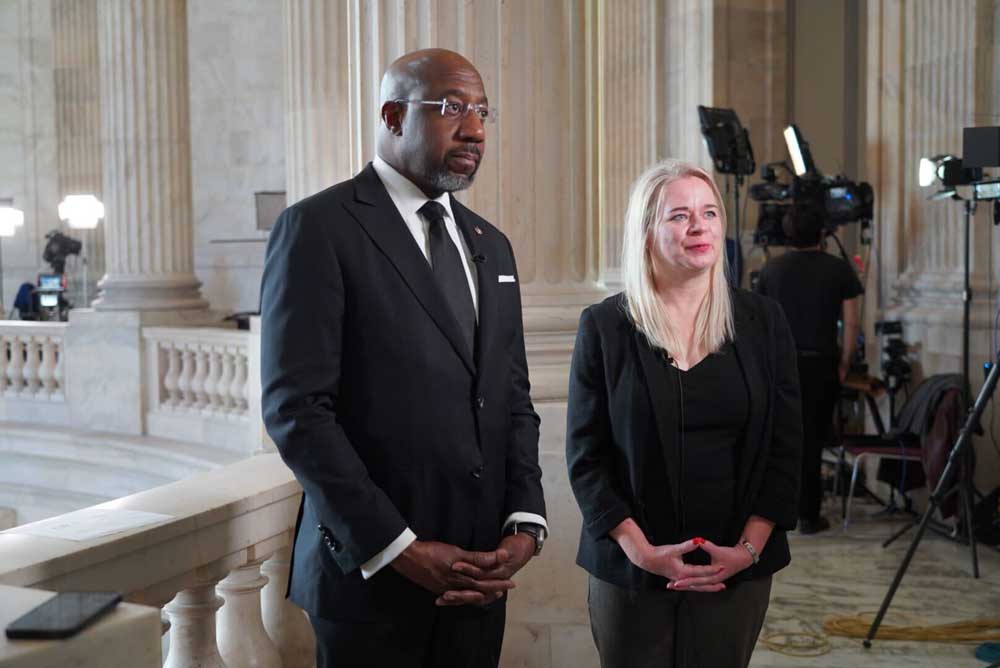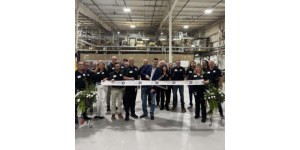Dalton woman at center of Warnock’s Medicaid expansion efforts
Published 8:00 am Monday, March 11, 2024

- From left, U.S. Sen. Raphael Warnock and Dalton resident Heather Payne.
When U.S. Sen. Raphael Warnock attended President Joe Biden’s State of the Union address on March 7, he brought Daltonian Heather Payne as a guest.
“It’s important to hear her story,” Warnock, a Democrat, said in statements to the Dalton Daily Citizen shortly before the address on Thursday in Washington, D.C. “This is about centering ordinary people rather than the politics.”
Trending
Payne worked as an emergency room and labor and delivery travel nurse for more than 10 years.
“Sometimes I had healthcare, sometimes I did not,” she said. “It was very easy to fall in the gap, sometimes, states that you’re working in don’t take your healthcare — typically, the options I had were between $550 to $1,200 a month, which was just too much for me.”
Her income level, however, prevented her from Medicaid eligibility.
In 2022, Payne was without healthcare coverage of any kind.
“I started having some health problems and I went to the emergency room,” she recounted. “I was having headaches, difficulty swallowing, things like that.”
She saved up enough money to pay for a visit to a neurologist out of pocket.
Trending
“A few months later, after paying for imaging, labs, the doctor fee, all of these bills that people get hit with when they have health problems, it was determined that I had a series of small strokes,” she recounted. “This left me, as I recovered, unable to do the job that I could formerly do — when you’re a nurse, you typically spend 12 hours on your feet and I just could not do that anymore.”
She said she is awaiting a determination on her eligibility for Social Security Disability Insurance.
Without healthcare coverage, she said she is unable to see specialists or pay for procedures.
“You just can’t afford it,” she said. “What Medicaid expansion would do for so many Georgians is just to allow them to get the healthcare that they need.”
If it can happen to a travel nurse, Payne said it could happen to anyone.
“When you have a health problem come out of nowhere — a stroke, a heart attack, a car accident, cancer — you can’t really anticipate these things,” she said, “and it can leave your family’s finances absolutely decimated.”
Warnock said Payne’s story is yet another reason why he believes Medicaid should be expanded in Georgia.
“We’ve had the Affordable Care Act on the books now for more than a decade, Georgia is one of only 10 states that’s refusing to expand Medicaid,” he said. “This is not about politics, this is about people — here’s a woman who has spent her life and career providing healthcare for others, serving as an emergency nurse, and when it came time for her to get healthcare, she couldn’t afford it.”
Warnock said an estimated 640,000 Georgians fall into the same healthcare coverage gap as Payne.
“When I came to the Senate, I was able to convince my colleagues to put $1.2 billion of added incentives in a piece of legislation to further incentivize Georgia to expand Medicaid,” he said, “and sadly, our legislature so far has left that $1.2 billion sitting on the table.”
As for subsequent efforts to persuade Georgia’s Republican lawmakers to change their stance on Medicaid expansion, Warnock said, “Honestly, I don’t know what else we could do.”
Meanwhile, Warnock said Georgia continues to subsidize healthcare in other states that did opt to expand Medicaid.
“Not only do we see people like Heather in the healthcare coverage gap, we’ve had about 10 or 11 of our hospitals — most of them in rural areas — to close,” he said. “I don’t know what further incentives you need.”
Warnock addressed a Georgia House proposal to form a “comprehensive health coverage commission” during the 2024 General Assembly session — in effect, spelling the end of any efforts to expand Medicaid in Georgia this year.
That represents a missed opportunity, he contends.
“And it has real human consequences,” Warnock continued. “And you don’t need to look any further than somebody like Heather.”
At a Greater Dalton Chamber of Commerce event in January, two local lawmakers indicated they were at least open to the possibility of expanding Medicaid coverage in the state.
“It could be cheaper for us to expand Medicaid,” District 2 state Rep. Steve Tarvin remarked.
District 54 state Sen. Chuck Payne also said he believed Medicaid expansion was something “we need to start looking at” in Georgia.
However, District 4 state Rep. Kasey Carpenter — like Tarvin and Payne, a Republican — said he remained a hard no on the matter.
“The federal government says it’s going to budget at this level,” he said. “But we all know what they do. When everyone gets on board, they start pulling the strings.”
According to United States Census Bureau data from late 2023, an estimated 1.2 million Georgians were without any form of healthcare coverage.
“I’ve seen this happen to my patients and it’s happened to me,” the longtime nurse said. “I’ve provided care for people for over a decade and now I don’t have the care that I need.”





